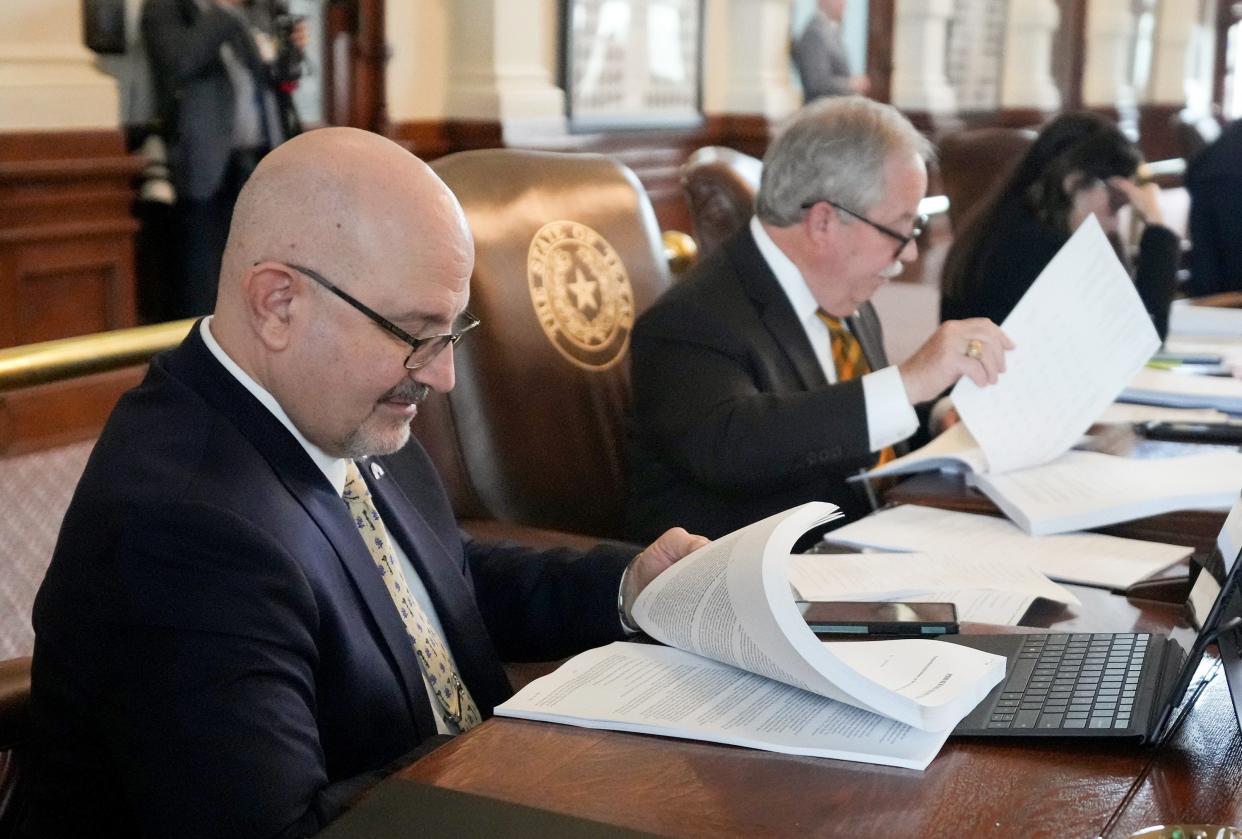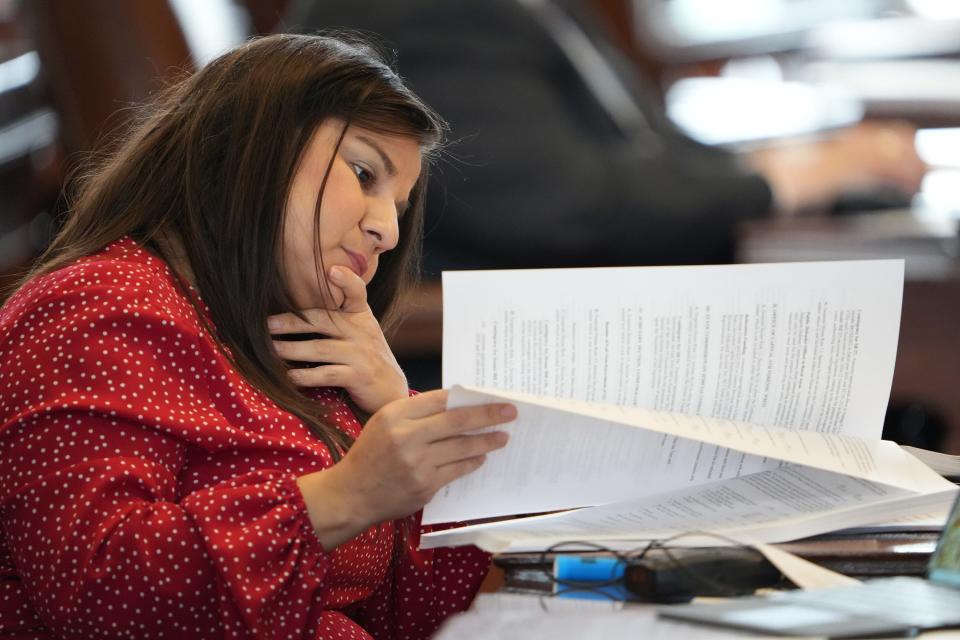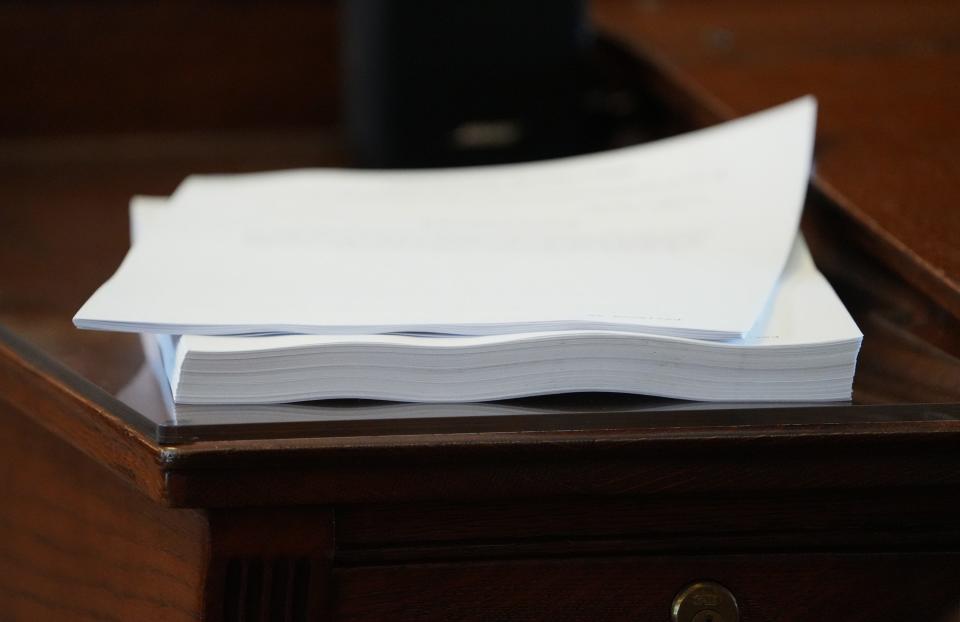Texas biennium budget bill grows to $321 billion with tax relief, border spending plans

- Oops!Something went wrong.Please try again later.
- Oops!Something went wrong.Please try again later.
The Texas Senate on Friday approved a budget deal lawmakers engineered to spend $321.3 billion over the next two years to fund state operations and which includes earmarks for increased border spending, electric and water infrastructure projects, education and other programs.
In the bicameral budget released Thursday, more than 1,000 pages detail the Legislature's spending priorities for the 2024-25 biennium, including $17.6 billion for property tax relief and $5 billion to build new gas-powered energy plants.
The Senate green lighted the proposal with a 29-2 vote Friday. Sens. Roland Gutierrez and José Menéndez, both Democrats from San Antonio, opposed the budget bill, citing concerns on teacher pay and education funding.
The General Appropriations Act, negotiated by teams from each chamber led by Sen. Joan Huffman, R-Houston, and Rep. Greg Bonnen, R-Friendswood, will spend $144.1 billion in general revenue money over the next two years. Additionally, lawmakers released, and the Senate unanimously approved Friday, a supplemental budget totaling $15.1 billion to ensure state funding for the fiscal year ending in August.
"This is a once-in-a-generation opportunity to make strategic and informed community investments in our state and return billions of dollars back to the taxpayers," Huffman, chair of the Senate Finance Committee, said Friday as she laid out the bill on the Senate floor.
Lt. Gov. Dan Patrick was complimentary of Huffman after the budgets were approved, saying he looks forward to seeing her continue to work as the lead budget writer in the Senate.
Indicating the status of key legislative issues that have driven the session, namely property tax relief and measures to enhance the state's electric grid, the budget allots less for the construction of dispatchable energy plants than had been previously sought by Patrick.
Through the Texas Energy Fund, $5 billion would be allocated to create a low-interest loan program to incentivize building new generating facilities. The money is earmarked for Senate Bill 2627, which came together after SB 6, a Patrick priority bill seeking $10 billion for the program, failed to gain traction in the House.
More: House panel recommends impeaching Texas Attorney General Ken Paxton amid allegations
For property taxes, budget writers allocated $12.3 billion in new relief while maintaining $5.3 billion in previous cuts.
Although the money has been set aside, the preferred mechanism for property tax relief has not yet been decided as lawmakers have not come to an agreement on whether to pursue an increased homestead exemption or a reduction in the amount a home's value can increase in a given year.
House Republicans and House Speaker Dade Phelan, R-Beaumont, have sought to lower the annual appraisal cap from 10% to 5%, which has been ill-received by Patrick, a Houston Republican who presides over the Senate.
As a result, the breakdown of how much money and attention will go to appraisal caps as opposed to the homestead exemption remains shrouded by legislative deal-making.
"Those numbers have not been decided, so it's hard to say specifically," Huffman said.

Over weeks of exchanging banter that sometimes grew tense and some name calling on Twitter, Patrick remained dedicated to seeing the state's homestead exemption increase from $40,000 to $70,000, with additional allowances for older adults and disabled homeowners.
In what could be seen as a friendly overture, the House amended the Senate's homestead proposal to increase the exemption to $100,000, while keeping in place a 5% decrease in the appraisal cap.
On Thursday evening, the Senate refused to concur with House amendments to the property tax proposal, meaning negotiations will continue with a deadline by the end of Sunday.
Border security and Gov. Greg Abbott's border enforcement initiative, Operation Lone Star, received a $5.1 billion allocation in the budget, which exceeds the $4.6 billion that had been previously expected.
Allowing for the creation of a Texas Border Force, the budget allocates $64 million for provisions laid out in House Bill 7, a border security package that passed the Senate on Wednesday and awaits approval in the House.
More: Will Texas create a new border police force? Senate OKs bill; House to review proposal.
As per HB 7, the Department of Public Safety would contain the border force within the Texas Rangers and spend the allocated money on technology and equipment for border enforcement. Additionally, lawmakers allocated $18 million to create a compensation program for land owners who have experienced damage due to border crossings.
The biennium budget also provides money to bolster several aspects of the state's infrastructure, including $1.5 billion for broadband and telecommunications services, $5.8 billion each fiscal year dedicated by the Texas Water Development Board to regulate and monitor groundwater as well as $10 billion to address leaking water wells.
The budget also dedicates $23.4 billion in each year of the next two years to the Texas Higher Education Coordinating Board to fund a professional nursing shortage reduction program.
While the budget of $321 billion is more than the original proposal of $302 billion from the House and $308 billion from the Senate, not everyone was pleased with the financing decisions.

Still making up a large portion of the budget, the $70.9 billion meant to fund public education is billions less than previous budget proposals from both chambers this session.
Education advocacy groups responded in frustration Thursday, as measures to provide teacher pay raises and an increase to per pupil funding were not included in the budget. Texas Education Agency Commissioner Mike Morath, however, could see his salary increase from $220,374.84 to $325,000 under the new budget, however, a statement Thursday evening from the TEA said the commissioner will not be accepting a pay raise.
"The fact that there is no pay raise in this budget is a huge slap in the face to every single one of our teachers. Teachers are expected to selflessly dedicate their lives to the education of our children," Gutierrez said in a statement after voting against the budget. "In Uvalde, teachers sacrificed their lives for our children. And they won't even help them keep up with inflation?"
"This is the biggest surplus ever. Teachers deserve better than this bullshit from the Texas Legislature," he said.
HB 100 by Rep. Ken King, R-Canadian, remains as the only avenue seeking to increase per pupil funding and aspects of the education allotment in the budget are contingent on its passage. The bill would raise spending by $140 — to $6,300 — over two years. That bill, however, could stall after the Senate added a $500 million controversial school choice program, which the House has signaled strong opposition to.
Most of the questions presented to Huffman on the floor revolved around education funding. During the debate, Senate Education Committee Chairman Brandon Creighton, R-Conroe, fielded questions on diversity, equity and inclusion funding, telling Sen. Royce West, D-Dallas, that the controversial SB 17, which prohibits universities from housing such programs, "will pass."
Outside of excluded education proposals, specific provisions in both the biennium and supplemental budgets would not allow Texas Attorney General Ken Paxton to spend money from his office to settle a $3.3 million settlement for a whistleblower lawsuit four of his former top aides filed against the agency.
Republican and Democratic lawmakers have expressed opposition to using state money to settle the whistleblower suit, which four former attorney general’s office employees filed in 2020 alleging they were improperly fired after reporting to the FBI what they believed to be criminal conduct by Paxton.
Lawmakers in the House still need to give final approval to the latest proposed budget, which is the only constitutionally mandated task the Legislature must complete before the session adjourns Monday.
This article originally appeared on Austin American-Statesman: Texas Legislature: Budget for 2024-25 biennium grows to $321 billion

